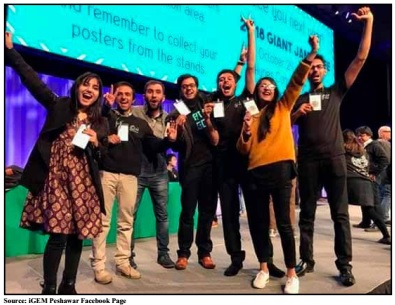Pakistani Students Win Silver in International Genetic Engineering Competition at Boston
By RiazHaq

A team of undergraduate students representing Peshawar has won a silver medal in a genetic engineering competition organized by the International Genetically Engineered Machine (iGEM) Foundation in Boston, Massachusetts.
The team was made up of students from several cities and towns across Pakistan including Lahore, Attock, Islamabad, Multan, Faisalabad, Khyber Agency, Nowshera, Charsadda, Peshawar, Swabi and Mardan.
The team was hosted by the Institute of Integrative Biosciences of CECOS University of IT and Emerging Sciences Peshawar. It was sponsored by Khyber-Pakhtunkhwa (KP)’s Directorate of Science and Technology, according to media reports.
The team's silver-medal-winning 2017 entry is a genetically engineered fish called "Reporter Fish" that can detect five different heavy metals and change color to indicate the presence of metal contamination in the water. It used an Arduino electronic circuit board with bacterial-human interface device that enables bacteria to detect and report contamination.
The Peshawar team also participated in iGEM 2016 competition and won a Bronze medal. The 12-member team last year comprised 5 female and 7 male students.
Stanford Challenge
Earlier this year, a three-member team of Pakistani students, including a female student from Islamabad's National University of Science and Technology (NUST), won the first place in a contest organized by the Stanford Center of Longevity. The team's entry is a device they designed and prototyped that enables tremor patients to perform daily routine tasks.
Higher Education in Pakistan
Wins such as the iGEM silver medal and the first place in Stanford Challenge are the result of improvements in higher education in Pakistan since the year 2000.
There are over three million students enrolled in grades 13 through 16 in Pakistan's 1,086 degree colleges and 161 universities, according to Pakistan Higher Education Commission report for 2013-14. The 3 million enrollment is 15% of the 20 million Pakistanis in the eligible age group of 18-24 years. In addition, there are over 255,000 Pakistanis enrolled in vocational training schools, according to theTechnical Education and Vocational Training Authority (TEVTA).
Pakistani universities have been producing over half a million graduates, including over 10,000 IT graduates, every year since 2010, according to HEC data. The number of university graduates in Pakistan increased from 380,773 in 2005-6 to 493,993 in 2008-09. This figure is growing with rising enrollment and contributing to Pakistan's growing human capital.
Higher education in Pakistan has come a long way since the country’s independence in 1947 when there was only one university, the University of Punjab. By 1997, the number of universities had risen to 35, of which three were federally-administered and 22 were under the provincial governments, with a combined enrollment of 71,819 students. A big spending boost by President Pervez Musharraf helped establish 51 new universities and awarding institutions during 2002-2008. This helped triple university enrollment from 135,000 in 2003 to about 400,000 in 2008, according to Dr Ata urRehmanwho was responsible for promoting higher education during Musharraf years. There were 161 universities with 1.5 million students enrolled in Pakistan as of 2014.
R&D Investment
Rise of research and publications at Pakistani universities began during the Musharraf years when the annual budget for higher education increased from Rs 500 million in 2000 to Rs 28 billion in 2008, to lay the foundations of the development of a strong knowledge economy, according to Dr Ata urRehman. Student enrollment in universities increased from 270,000 to 900,000 and the number of universities and degree-awarding institutions increased from 57 in 2000 to 137 by 2008. Government R&D spending jumped seven-fold as percentage of GDP from 0.1% of GDP in 1999 to 0.7% of GDP in 2007. It has since declined as percentage of GDP.
Pakistani students, scientists and researchers are continuing to produce highly recognized and cited research in spite of serious economic and security challenges. Enrollment in higher education is rising and giving a boost to innovation. With better policy focus and more investment in higher education, Pakistan can make an even greater impact with its young demographics on the world scene.
-----------------------------------------------------------------------------

